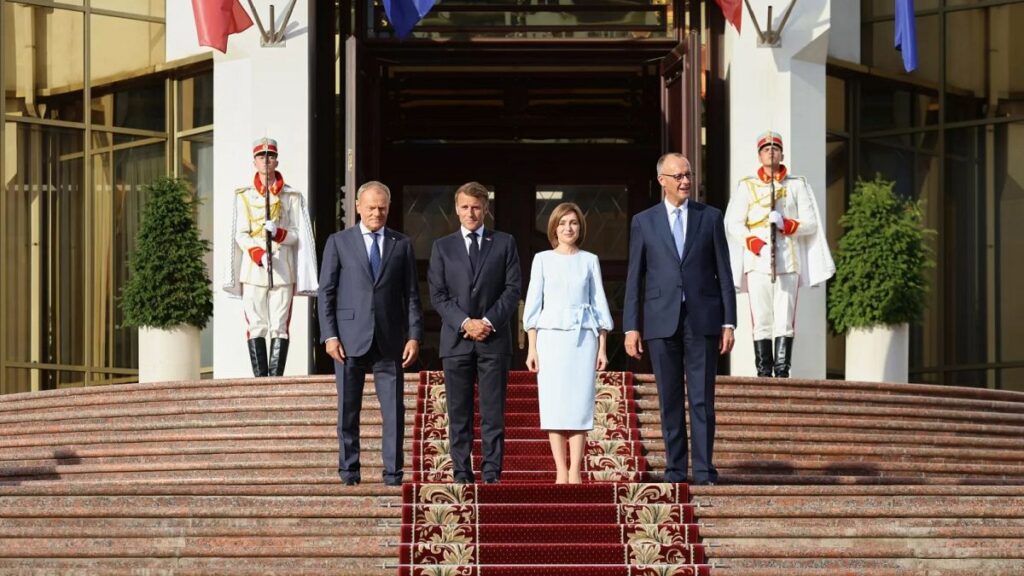With the renewed promise of future EU membership, the French, German and Polish leaders visited Moldova on 27 August, the country’s national day. The message from the French President Emmanuel Macron, German chancellor Friederich Merz and the Polish Prime Minister Donald Tusk to Moldova’s pro-European president, Maia Sandu, was simple: To reaffirm the EU’s support for Chișinău’s accession to the bloc.
This meeting comes one month before parliamentary elections in Moldova scheduled for 28 September.
According to the EU, the Moldovan electoral campaign and elections will take place under the threat of hybrid offensives by Russia, as happened in the previous presidential elections won by a handful of votes by Maia Sandu against her pro-Russian opponent.
The French leader and his counterparts therefore sought to send a signal to voters.
“Kremlin propaganda tells us that Europeans want to prolong the war and that the European Union oppresses its people. These are lies. Unlike Russia, the European Union does not threaten anyone and respects the sovereignty of each member state,” Macron said.
“It is a union of prosperity and peace. The European Union is in no way the Soviet Union.”
Hybrid warfare and political hesitations
The Moldovan president denounced a Russian hybrid operation involving vote-buying, cyberattacks and disinformation in the run-up to the election campaign.
Sandu’s words on hybrid warfare were explicitly confirmed by German Chancellor Merz.
“In the run-up to the upcoming parliamentary elections in this country, not a day goes by without massive hybrid attacks from Russia. Moldova’s democracy is in the crosshairs, both online and offline. A free, open, liberal society is in the crosshairs,” he said.
Moldova officially has 2.6 million inhabitants, some of whom hold Romanian passports and passports from other EU countries.
Many voters belong to the Moldovan diaspora scattered across Western Europe and Russia.
Polls predict a neck-and-neck race until the last vote between pro-European and pro-Russian political forces, the Socialist and the Communist Parties.
Moldova’s ruling pro-EU Party of Action and Solidarity (PAS) has been in power since 2021 and risks losing the forthcoming election.
Located between Romania and Ukraine, Moldova is directly affected by the geopolitical turmoil caused by Moscow’s war of aggression against Kyiv.
Moscow also controls Transnistria, the eastern fringe of Moldova (on the border with Ukraine, 200 km from Odessa), which seceded from it after a small-scale war won by pro-Russian forces in 1992.
Moldova claims sovereignty over this strip of land on the eastern bank of the Dniester River with the full support of Western countries.
Is EU enlargement the key to Moldova’s security?
Emmanuel Macron offered Moldova strong support towards membership of the European Union. The French head of state spoke of a “historic opportunity” for Chisinau.
Accession negotiations began in June last year. However, Moldova’s candidacy goes hand in hand with that of Ukraine.
The pro-EU Moldovan leadership has repeatedly called for the decoupling of Moldova and Ukraine’s EU accession processes, fearing that Kyiv’s European prospects will take much longer given Ukraine’s size and the war with Russia.
However, the EU is reluctant to grant Chișinău fast-track accession process for fear of sending a negative signal to Ukraine.
Romanian MEP Siegfried Mureșan, head of the EU–Moldova Parliamentary Association Committee, is one of Moldova’s most vocal advocates in Brussels told Euronews last July:
“Integrating the Republic of Moldova into the EU will be a smaller effort. The integration of small countries is easier than the integration of bigger countries.”
“Moldova is a small country, and with our support, it can achieve a lot with sums that are not significant for the EU—but are transformative for Moldova,” he said.
The EU is ready to invest almost €2 billion to boost Moldova’s economy and reduce its vulnerability to external pressures.
Moldova’s energy infrastructure has undergone a significant transformation since 2022. It is now connected to the European electricity grid and the EU has financed major upgrades to its domestic distribution systems.
Chişinău has also committed to generating 27% of its energy from renewable sources by 2030.
Despite setbacks – including a slowdown attributed to the energy shock from the war in Ukraine – the European Bank for Reconstruction and Development (EBRD) considers Moldova’s economy resilient.
In a landmark shift, over 50% of Moldovan exports went to the EU in 2024, the highest in the country’s history.
Read the full article here
